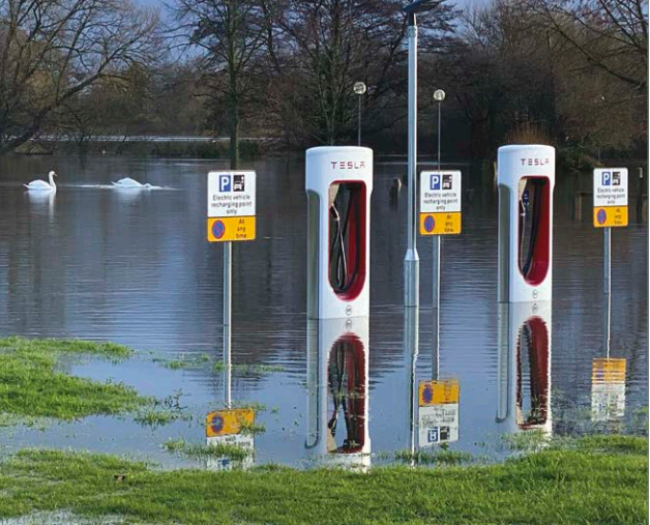Articles Menu

The Ecological Citizen Vol 3 Suppl B 2020
The climate crisis demands immediate and massive cuts in our emissions of greenhouse gases. In turn, this requires a transformation of the global economy – a transformation that would be unprecedented in scale, scope and speed. Such a shift to an ecologically sustainable economy cannot occur under capitalism. As a case study, this article looks at what would be required to meaningfully reduce emissions from road transport. Promoters of ‘green capitalism’ have claimed that the solution is electric cars powered by renewable energy. However, most of the emissions of an automobile are produced during its manufacture, and the profits of automobile companies are built around planned obsolescence and short lifecycles. The actual solution to minimizing greenhouse gas emissions from the transportation sector – as for the economy as a whole – is a system that is designed on the basis of rational social need rather than corporate profit.
The Intergovernmental Panel on Climate Change (IPCC) special report Global warming of 1.5°C (2018) describes the enormous gap between where we are and where we need to be to prevent dangerous levels of global warming. The 2015 Paris Agreement committed industrial nations to reduce their emissions sufficient to keep global temperatures within a 2°C rise over pre-industrial levels. In the final accord, highly vulnerable island nations and faith communities represented at the UN pressed the authors to include the 1.5°C limit as an aspirational target in the final draft of the accord, with 2°C as the backup target.
Soaring emissions over the past five years, rising atmospheric CO2 concentrations, icecap retreats, intensified storms, summer forest fires reaching even above the Arctic circle, and die-offs of the world’s coral reefs have all raised concerns about what even a little bit more warming would bring. Parts of the planet including the Arctic and many inland areas have already warmed beyond 1.5°C. California is now on fire much of the year; Australia has just seen historically unprecedented levels of bushfire. The worst hurricanes are twice as severe (more precipitation, slower passage, greater wind speeds) than they used to be. This is just the beginning of the banquet of consequences that humanity has prepared for itself and the more-than-human world.
Climate breakdown occurring much more quickly than expected is one reason why climate scientists now think that the goal just five years ago of limiting warming to 2°C “increasingly seems disastrous in this context” (Mooney and Dennis, 2018). The Paris pledges were never sufficient even to keep warming below 3°C, let alone 2°C. In any case, few of the signatories have even managed to meet the low bars they set for themselves, and the world’s largest countries – including China, the US and Canada – have us on track to a 4–5°C warming. As CO2 concentrations continue growing, preventing runaway warming is going to require ever deeper, truly draconian cuts in emissions, which will mean greater economic disruption. IPCC estimates already show us needing to achieve a near vertical drop in emissions in this decade. Every day we delay getting off of fossil fuels increases the probability that we will not be able to save the planet’s ecosystems.
The 2018 IPCC special report painted a stark portrait of how quickly the world is heating up and called on governments to take immediate steps to suppress emissions. It argues that in order to prevent temperatures from rising beyond 1.5°C above preindustrial levels, anthropogenic CO2 emissions must decline by around 45% worldwide from 2010 levels by 2030, and by 100% by 2050. As the report remarks (IPCC, 2018), such a huge reduction in global emissions,
would require rapid and far-reaching transitions in energy, land, urban and infrastructure (including transport and buildings), and industrial systems. […] These systems transitions are unprecedented in terms of scale […] and imply deep emissions reductions in all sectors, a wide portfolio of mitigation options and a significant upscaling of investments in those options.
Preventing ecological collapse thus requires transforming the world economy at a speed and scale that “has no documented historic precedent” (Mooney and Dennis, 2018). In the words of Myles Allen, Oxford University climate scientist and one of the authors of the IPCC report, “we need to reverse emissions trends and turn the world economy on a dime” (quoted in Davenport [2018]). Drew Shindell of Duke University, another author of the report, similarly remarked that the “monumental shift toward decarbonization” that is demanded, “would really be an unprecedented rate and magnitude of change” (quoted in Mooney and Dennis [2018]).
Capitalism prioritizes growth and profits over people and planet
[Read the whole article here.
[Top photo: Tesla car charging points at Sindlesham, UK, underwater owing to heavy winter rain (photo: Phil Creighton, Editor of The Wokingham Paper.]